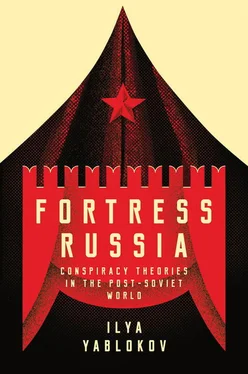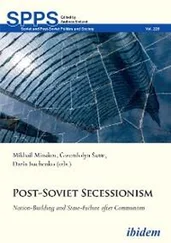On 17 May 2005, Surkov gave a speech at a closed session of Delovaia Rossiia ( Business Russia ), a public association of Russian businessmen, in which he identified Russia’s current priority as the creation of a sovereign democracy and ‘a truly national elite’. The then-head of Delovaia Rossiia, Boris Titov, later held that the version of the speech which was disseminated by the press distorted what Surkov had actually said (Stanovaia, 2005). All the same, the issues raised in this version of the speech have not officially been denied. Hence Surkov’s speech, at least in the form that leaked to the press, offered an intellectual framework for subsequent public debates on national identity. Furthermore, it was delivered only a few weeks after Putin identified the collapse of the Soviet Union as a ‘major geopolitical disaster’. The articulation of these two ideas in such a short space of time demonstrates growing concern among political elites at this time about social cohesion, something which was considered essential for the future stability of the regime.
In particular, Surkov was worried both about Russia’s territorial integrity, and the colour revolutions in the CIS countries. He considered concerns raised by the European Union, Finland and Estonia about the supposed suppression of the cultural heritage of the Finno-Ugric nationalities living in the Russian Federation as a threat to Russia. Noting that the territories where these ethnic groups lived were rich in oil, Surkov observed: ‘I am not a supporter of conspiracy theories. However, it is obvious that this is a planned action’ (Surkov, 2005). This remark served to encourage the mobilization of political and business elites in support of the government. At the same time, Surkov pointed to a lack of loyal elites in Russia who could contribute to Russia’s development and resist Western influence. He compared this to the political situation in the last years of the Soviet Union:
Unfortunately, an enormous part of our bureaucracy views [the vertical structures of power] with neither understanding nor comprehension of the processes which are currently taking place [in the country]. This is a problem of education and the backwardness of [our] political culture. This was the reason why the Soviet Union collapsed. This could become the cause of Russia’s collapse. Whereas the Soviet Union collapsed with majesty – it was a catastrophe worthy of a film – we shall decay silently and that will be the end. (Surkov, 2005)
Reference to the Soviet collapse in both Putin’s and Surkov’s texts demonstrates the centrality of this event in the elite’s interpretation of affairs. It seems that the Kremlin’s leaders realized the hidden potential of the Soviet collapse as a symbol. These two speeches, although they both evoked the notion of the Soviet collapse, were addressed to different audiences and aimed to shape perceptions of the demise of the Soviet Union among different social groups and to demonstrate its impact on post-1991 national identity. The absence of public consensus about the Soviet collapse left a vacuum that the political establishment could fill as it wished, a space in which to shape a favourable identity discourse.
Surkov’s notion of Russian identity included a definition of the West as Russia’s competitor rather than its enemy. This was a major shift in thinking. In an interview with Der Spiegel , Surkov said: ‘The people have attained a new sense of sobriety. The romantic days are gone. We no longer have the feeling of being surrounded by enemies, but rather by competitors’ (Klussmann and Mayr, 2005). No longer seeing Russia as a besieged nation, but as one which could now engage in acts of political pragmatism with the West, opened up a new space for the populist expression of Russia’s inequality in relation to ‘the foreign Other’; this would prove vital for further conspiratorial mythmaking. That Surkov’s statement was made in an interview with a leading European periodical was a way of suggesting to the West that by the mid 2000s the Russian political elite, and society at large, had developed greater open-mindedness and was now interested in building relations with other countries because of mutual economic interests.
Yet Surkov had a different, more conspiratorial message for his domestic audience. In a speech addressed to activists of the United Russia party, Surkov again put forward his pragmatic approach, but this time he explicitly identified the Western protagonists who, in his view, were interested in exploiting Russia’s natural resources:
If we are not going to rule ourselves, but entrust everything… to transnational companies, to powerful nongovernmental charitable organizations that dream of ways to bring us charity…. Then I think they will leave us just what they consider essential for us to live on, rather than what we would have kept for ourselves…. That does not mean they are enemies. No, they are competitors…. It is nothing personal. (Surkov, 2010, pp. 102–3)
It is this shift in the perception of the West – from enemy to shrewd competitor – which helped to relocate anti-Western conspiracy theories from the margins of Russian political discourse to its centre. From now on, the idea of economic and political competition with the West could be used by mainstream politicians and supported by factual evidence taken, selectively, from the global political agenda. With that reconceptualization of Russian–Western relations, the language of anti-Western conspiracy became an inherent part of mainstream political discourse.
Surkov’s comparison of Russia and Europe, as made in a range of texts on sovereign democracy, had two important particularities. First, he admitted that Russia was a European country, despite attempts by some Russian nationalists to see it as something separate. In an article entitled Natsionalizatsiia budushchego ( The Nationalization of the Future ), Surkov stressed the importance of pragmatism in establishing relations with other European countries:
We should note again that the people living to the West of Russia vary in their attitudes: there are those who want to subjugate her [Russia] and those who are counting on a mutually beneficial partnership. To the former, our democracy can show its determination to maintain its sovereignty, and to the latter it can show openness, flexibility and productive cooperation. Not falling out with Europe and keeping close to the West are essential elements in the construction ( konstruirovaniia ) of Russia. (Surkov, 2006a)
On the one hand, this strategy of improving relations with European countries by depicting them as a complex conglomerate of opinions could provide a basis for Russia’s integration into European and global institutions. Russia’s future is inherently connected with that of Europe, and this seems to be one of the pillars on which Surkov’s political philosophy is built (Mäkinen, 2011). On the other hand, Surkov’s emphasis on the groups which, he alleges, stand to gain from Russia’s collapse, for economic and political reasons, became the basis for the dissemination of his anti-Western conspiratorial discourse. Indeed, as Andrey Tsygankov demonstrates, some political circles inside the USA do have anti-Russian views, regularly take a critical stance on developments in the post-Soviet space, and urge the US government to enact harsher policies towards Russia (Tsygankov, 2009). The dichotomy in Surkov’s representation of the West has challenged a dominant perception of the West as a single, undifferentiated entity. However, an analysis of domestic and international events put forward by public intellectuals (which we shall discuss later) focused in particular on groups with an economic or political interest in Russia’s collapse. As a result, the public was provided with what at first seemed like a sophisticated description of global events, but which once again turned into a one-dimensional picture of Russia under threat from the malign activities of powerful political groups in the West.
Читать дальше
Конец ознакомительного отрывка
Купить книгу












